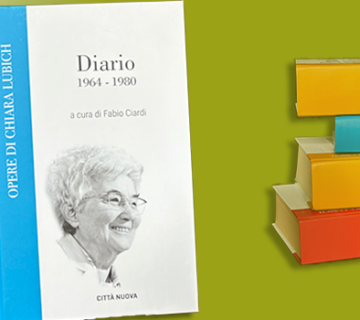 “My mother, in her eighties, has begun to make steps on the flowery path:
“My mother, in her eighties, has begun to make steps on the flowery path:
gradually she no longer thought, and saw things with the heart.
Finally, her heart gave in and her pure eyes were all that remained.
She’s often a child of six or seven and asks about her small friends;
sometimes she weeps because of her longing to see her Mamma and Papa;
but then she trustfully smiles as she steps in and out of the flowery path.
Occasionally, following my Mother, I also step onto the flowery path,
and the worrisome burdens of the world are turned into light clouds in the sky;
I also become a mere flower within my mother’s secure enclosure.”

These are the opening lines of the preface of the book “My Mother’s Fowery Path” (1). The book, a collection of episodes and events that warm the heart, was written by Korean author, Maria Goretti Jeung Ae Jang, poet and nurse. She writes of the period she spent beside her mother with Alzheimer’s.
The book is the 2013 recipient of the South Korean Ministry of Health and Welfare’s National Award for good practice in assisting Alzheimer’s patients. The award ceremony took place on September 16, 2013 in the Conference Hall of Coex and the award was given by the Minister of Health and Welfare.
“When I wrote about the experiences with my mother,” the surprised author recounts, “I didn’t even know that such an award existed. My only hope was that the book would be helpful to family members whose lives have been impacted by this illness. This is a great gift for me that I never thought of receiving. I only loved my mother who suffers with Alzheimer’s; then I wished to share these experiences with others. But I’m very happy because this was an opportunity to make the book known to many other people who might read it and see that no illness can remove one’s human dignity.”

The author continues: “Alzheimer’s disease is a tiring process for both patient and family. But I think that suffering is purifying. I’d like to propose that we not fear Alzheimer’s, but accept it as an illness that can affect anyone, and to try to face the treatment of the disease through the eyes of the patient.” She concluded: “Let us do away with the negative feelings in our hearts and look after these people with love. Then Alzheimer’s will be a side of life that we will be able to live with.”
“With all my heart I thank Chiara Lubich, whom I consider to be my spiritual mother,” Jang confessed, “because she taught me to love. The spirituality of unity indeed helped prepare me to see the face of the suffering Jesus in my mother, beyond the illness which rendered her more and more helpless. This was the key that enabled me to see her as truly precious and to recognize and appreciate her human dignity. Chiara’s words rang loud and clear to me, which she spoke many years ago: “You must be mothers of your mothers. . .” For me this was a veritable mandate.”
(1) Translation from Korean


 Italiano
Italiano Español
Español Français
Français Português
Português



Muito belo! Como posso adquirir o livro?
Gostei do Resumo do livro:O caminho florido da minha mãe ,pois eu cuido de minha mãe e ela está com a doença do Alzheimer e estes depoimentos, experiências me ajudam a cuidar dela com mais amor.É verdade o que Chiara nos disse: que devemos ser mãe de nossa mãe atualmente estou sendo.